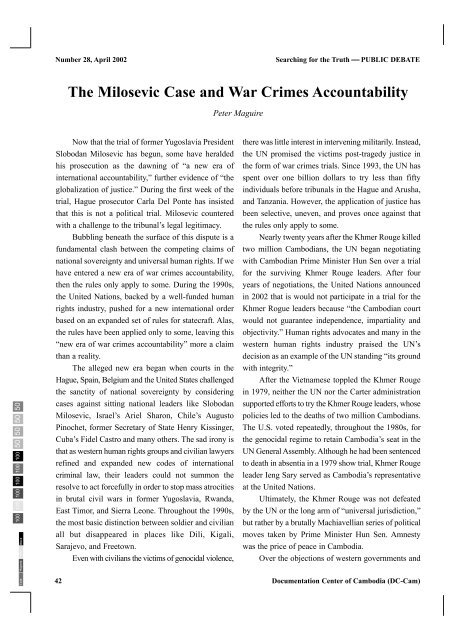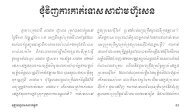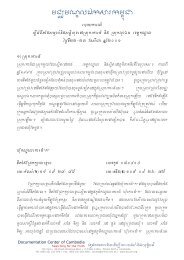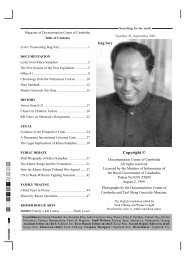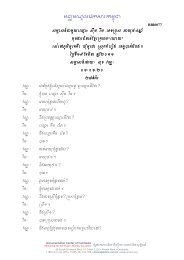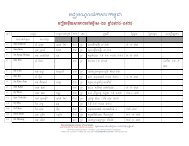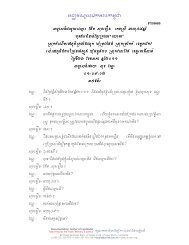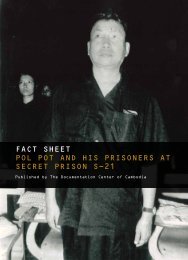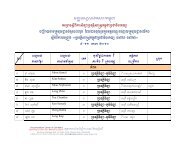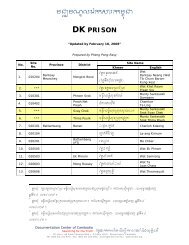Searching for the truth Issues 28 - Documentation Center of Cambodia
Searching for the truth Issues 28 - Documentation Center of Cambodia
Searching for the truth Issues 28 - Documentation Center of Cambodia
Create successful ePaper yourself
Turn your PDF publications into a flip-book with our unique Google optimized e-Paper software.
100 100 100 100 100 100 50 50 50 50<br />
Black<br />
Yellow<br />
Magenta<br />
Cyan<br />
Number <strong>28</strong>, April 2002<br />
42<br />
<strong>Searching</strong> <strong>for</strong> <strong>the</strong> Truth ⎯ PUBLIC DEBATE<br />
The Milosevic Case and War Crimes Accountability<br />
Now that <strong>the</strong> trial <strong>of</strong> <strong>for</strong>mer Yugoslavia President<br />
Slobodan Milosevic has begun, some have heralded<br />
his prosecution as <strong>the</strong> dawning <strong>of</strong> “a new era <strong>of</strong><br />
international accountability,” fur<strong>the</strong>r evidence <strong>of</strong> “<strong>the</strong><br />
globalization <strong>of</strong> justice.” During <strong>the</strong> first week <strong>of</strong> <strong>the</strong><br />
trial, Hague prosecutor Carla Del Ponte has insisted<br />
that this is not a political trial. Milosevic countered<br />
with a challenge to <strong>the</strong> tribunal’s legal legitimacy.<br />
Bubbling beneath <strong>the</strong> surface <strong>of</strong> this dispute is a<br />
fundamental clash between <strong>the</strong> competing claims <strong>of</strong><br />
national sovereignty and universal human rights. If we<br />
have entered a new era <strong>of</strong> war crimes accountability,<br />
<strong>the</strong>n <strong>the</strong> rules only apply to some. During <strong>the</strong> 1990s,<br />
<strong>the</strong> United Nations, backed by a well-funded human<br />
rights industry, pushed <strong>for</strong> a new international order<br />
based on an expanded set <strong>of</strong> rules <strong>for</strong> statecraft. Alas,<br />
<strong>the</strong> rules have been applied only to some, leaving this<br />
“new era <strong>of</strong> war crimes accountability” more a claim<br />
than a reality.<br />
The alleged new era began when courts in <strong>the</strong><br />
Hague, Spain, Belgium and <strong>the</strong> United States challenged<br />
<strong>the</strong> sanctity <strong>of</strong> national sovereignty by considering<br />
cases against sitting national leaders like Slobodan<br />
Milosevic, Israel’s Ariel Sharon, Chile’s Augusto<br />
Pinochet, <strong>for</strong>mer Secretary <strong>of</strong> State Henry Kissinger,<br />
Cuba’s Fidel Castro and many o<strong>the</strong>rs. The sad irony is<br />
that as western human rights groups and civilian lawyers<br />
refined and expanded new codes <strong>of</strong> international<br />
criminal law, <strong>the</strong>ir leaders could not summon <strong>the</strong><br />
resolve to act <strong>for</strong>cefully in order to stop mass atrocities<br />
in brutal civil wars in <strong>for</strong>mer Yugoslavia, Rwanda,<br />
East Timor, and Sierra Leone. Throughout <strong>the</strong> 1990s,<br />
<strong>the</strong> most basic distinction between soldier and civilian<br />
all but disappeared in places like Dili, Kigali,<br />
Sarajevo, and Freetown.<br />
Even with civilians <strong>the</strong> victims <strong>of</strong> genocidal violence,<br />
Peter Maguire<br />
<strong>the</strong>re was little interest in intervening militarily. Instead,<br />
<strong>the</strong> UN promised <strong>the</strong> victims post-tragedy justice in<br />
<strong>the</strong> <strong>for</strong>m <strong>of</strong> war crimes trials. Since 1993, <strong>the</strong> UN has<br />
spent over one billion dollars to try less than fifty<br />
individuals be<strong>for</strong>e tribunals in <strong>the</strong> Hague and Arusha,<br />
and Tanzania. However, <strong>the</strong> application <strong>of</strong> justice has<br />
been selective, uneven, and proves once against that<br />
<strong>the</strong> rules only apply to some.<br />
Nearly twenty years after <strong>the</strong> Khmer Rouge killed<br />
two million <strong>Cambodia</strong>ns, <strong>the</strong> UN began negotiating<br />
with <strong>Cambodia</strong>n Prime Minister Hun Sen over a trial<br />
<strong>for</strong> <strong>the</strong> surviving Khmer Rouge leaders. After four<br />
years <strong>of</strong> negotiations, <strong>the</strong> United Nations announced<br />
in 2002 that is would not participate in a trial <strong>for</strong> <strong>the</strong><br />
Khmer Rogue leaders because “<strong>the</strong> <strong>Cambodia</strong>n court<br />
would not guarantee independence, impartiality and<br />
objectivity.” Human rights advocates and many in <strong>the</strong><br />
western human rights industry praised <strong>the</strong> UN’s<br />
decision as an example <strong>of</strong> <strong>the</strong> UN standing “its ground<br />
with integrity.”<br />
After <strong>the</strong> Vietnamese toppled <strong>the</strong> Khmer Rouge<br />
in 1979, nei<strong>the</strong>r <strong>the</strong> UN nor <strong>the</strong> Carter administration<br />
supported ef<strong>for</strong>ts to try <strong>the</strong> Khmer Rouge leaders, whose<br />
policies led to <strong>the</strong> deaths <strong>of</strong> two million <strong>Cambodia</strong>ns.<br />
The U.S. voted repeatedly, throughout <strong>the</strong> 1980s, <strong>for</strong><br />
<strong>the</strong> genocidal regime to retain <strong>Cambodia</strong>’s seat in <strong>the</strong><br />
UN General Assembly. Although he had been sentenced<br />
to death in absentia in a 1979 show trial, Khmer Rouge<br />
leader Ieng Sary served as <strong>Cambodia</strong>’s representative<br />
at <strong>the</strong> United Nations.<br />
Ultimately, <strong>the</strong> Khmer Rouge was not defeated<br />
by <strong>the</strong> UN or <strong>the</strong> long arm <strong>of</strong> “universal jurisdiction,”<br />
but ra<strong>the</strong>r by a brutally Machiavellian series <strong>of</strong> political<br />
moves taken by Prime Minister Hun Sen. Amnesty<br />
was <strong>the</strong> price <strong>of</strong> peace in <strong>Cambodia</strong>.<br />
Over <strong>the</strong> objections <strong>of</strong> western governments and<br />
<strong>Documentation</strong> <strong>Center</strong> <strong>of</strong> <strong>Cambodia</strong> (DC-Cam)


